Sara Bain's Blog
November 23, 2015
Book Week Scotland and me
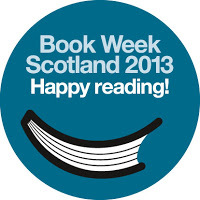 The week-long celebration of books and reading across Scotland has begun.It includes a host of free events showcasing many of the nation's authors, poets, playwrights, performers, illustrators and book lovers who are all coming together "to celebrate everything wonderful about the written word."Brought to bookshops, libraries, schools and loads of venues in over 400 events across the country, Book Week Scotland will highlight the words and works of some of the best Scottish wordsmiths and a few who are not so well known.The week stars people like Michael Faber, David MacPhail, Jackie Kay, Liz Lochhead, Diana Gabaldon, Paula Hawkins, Neil Oliver, Kate Mosse, Ian Rankin, Val McDermid, AL Kennedy, Christopher Brookmyre, Michael J Malone and me.
The week-long celebration of books and reading across Scotland has begun.It includes a host of free events showcasing many of the nation's authors, poets, playwrights, performers, illustrators and book lovers who are all coming together "to celebrate everything wonderful about the written word."Brought to bookshops, libraries, schools and loads of venues in over 400 events across the country, Book Week Scotland will highlight the words and works of some of the best Scottish wordsmiths and a few who are not so well known.The week stars people like Michael Faber, David MacPhail, Jackie Kay, Liz Lochhead, Diana Gabaldon, Paula Hawkins, Neil Oliver, Kate Mosse, Ian Rankin, Val McDermid, AL Kennedy, Christopher Brookmyre, Michael J Malone and me.
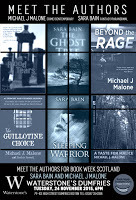 As part of my debut into the public domain, I will be at Waterstones, Dumfries, in a Meet the Author session with Ayrshire crime writer Michael J Malone. The event takes place on Tuesday, 24 November, at 6pm and, although I'm not certain how it will go as I normally shy away from any kind of public gathering starring me, like my writing I will just let it evolve.Michael J is one of those authors who can write just about anything ... and writes it well. His normal genre is Tartan Noir with a twist - a bit like a Martini with a Scotch Bonnet chilli. He takes a Scottish crime scene and turns it on its head to reveal the darkness in the characters affected by the stories' events. His award-winning crime books, Blood Tears, A Taste for Malice and Beyond the Rage are the kind of page turners expected of a high level writer.
As part of my debut into the public domain, I will be at Waterstones, Dumfries, in a Meet the Author session with Ayrshire crime writer Michael J Malone. The event takes place on Tuesday, 24 November, at 6pm and, although I'm not certain how it will go as I normally shy away from any kind of public gathering starring me, like my writing I will just let it evolve.Michael J is one of those authors who can write just about anything ... and writes it well. His normal genre is Tartan Noir with a twist - a bit like a Martini with a Scotch Bonnet chilli. He takes a Scottish crime scene and turns it on its head to reveal the darkness in the characters affected by the stories' events. His award-winning crime books, Blood Tears, A Taste for Malice and Beyond the Rage are the kind of page turners expected of a high level writer.
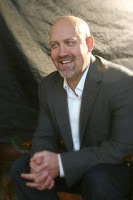 He has also ghost written an historical novel, The Guillotine Choice, based on a true account of a 1920s Algerian, sent to Devil's Island for a crime he did not commit.Not content with crossing the genres of fiction, Michael has also ventured into non-fiction with his book on self-development: Carnegie's Call.And that's not all. Michael has turned his talents to provide professional editorial and mentoring services which will inspire and help green-gilled authors to perfect their talents.You can read all about Michael and his books here.
He has also ghost written an historical novel, The Guillotine Choice, based on a true account of a 1920s Algerian, sent to Devil's Island for a crime he did not commit.Not content with crossing the genres of fiction, Michael has also ventured into non-fiction with his book on self-development: Carnegie's Call.And that's not all. Michael has turned his talents to provide professional editorial and mentoring services which will inspire and help green-gilled authors to perfect their talents.You can read all about Michael and his books here.
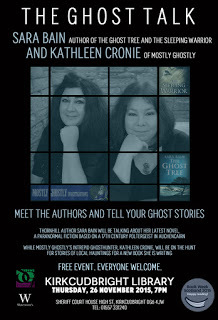 My second venture into the big wide world of publicity this week involves going on a Ghost Talk with Dumfries ghosthunter Kathleen Cronie.Those wonderful people at Dumfries and Galloway Libraries invited me to take on one of their events at Kirkcudbright Library and I couldn't think of a more fitting partner than Kathleen whose knowledge and enthusiasm for the region's favourite haunts have inspired some of her most successful ghost walks with her team of ghostbusters Mostly Ghostly.Kathleen is an interesting and eloquent speaker who tends to keep her audience captivated while she recounts some of her hair-raising stories of ghastly goings-on in Dumfries and Galloway's violent past.Her presence marries well with my second novel, The Ghost Tree, which was published in early October.The book is set in Kirkcudbrightshire and was inspired by one of the world's most well-known poltergeists - The Mackie or Rerrick Parish Poltergeist. You can read all about it here.I am still hearing stories from people who once lived or are still living close to that haunted steading. Incredibly, during my book launch in October, a lady came up to me and told me that she used to live in a house near the steading. When playing in the field, her brothers would mimic the shepherd and try to round-up sheep. She said that the flock always avoided being herded into a corner of the dyke: the corner close to the Ghost Tree. She told me one day they saw a strange, ghostly figure standing at that same corner and believed in the poltergeist.I would love to hear more stories about Rerrick and the steading and Kathleen will be looking for local ghost stories for a book she is writing on some of the region's best haunts.The event takes place on Thursday, 26 November at 7pm and everyone is invited to come along for a good old Ghost Talk before going home alone in the dark!
My second venture into the big wide world of publicity this week involves going on a Ghost Talk with Dumfries ghosthunter Kathleen Cronie.Those wonderful people at Dumfries and Galloway Libraries invited me to take on one of their events at Kirkcudbright Library and I couldn't think of a more fitting partner than Kathleen whose knowledge and enthusiasm for the region's favourite haunts have inspired some of her most successful ghost walks with her team of ghostbusters Mostly Ghostly.Kathleen is an interesting and eloquent speaker who tends to keep her audience captivated while she recounts some of her hair-raising stories of ghastly goings-on in Dumfries and Galloway's violent past.Her presence marries well with my second novel, The Ghost Tree, which was published in early October.The book is set in Kirkcudbrightshire and was inspired by one of the world's most well-known poltergeists - The Mackie or Rerrick Parish Poltergeist. You can read all about it here.I am still hearing stories from people who once lived or are still living close to that haunted steading. Incredibly, during my book launch in October, a lady came up to me and told me that she used to live in a house near the steading. When playing in the field, her brothers would mimic the shepherd and try to round-up sheep. She said that the flock always avoided being herded into a corner of the dyke: the corner close to the Ghost Tree. She told me one day they saw a strange, ghostly figure standing at that same corner and believed in the poltergeist.I would love to hear more stories about Rerrick and the steading and Kathleen will be looking for local ghost stories for a book she is writing on some of the region's best haunts.The event takes place on Thursday, 26 November at 7pm and everyone is invited to come along for a good old Ghost Talk before going home alone in the dark!
Published on November 23, 2015 15:35
September 29, 2015
The Ghost Tree launches in local haunts
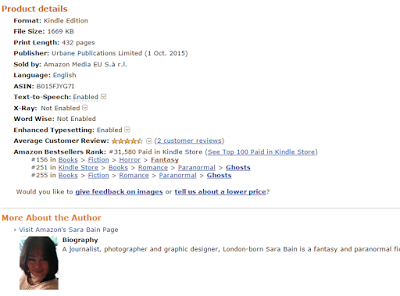 For most authors these days, getting a place anywhere close to number one million in the Amazon rankings is cause for breaking out the champagne.
For most authors these days, getting a place anywhere close to number one million in the Amazon rankings is cause for breaking out the champagne.There are so very many books out there, all jostling for the attention of potential readers, that most of them never see the light of day - day, of course, meaning within the top 100 of the bestsellers rank within the genre.
It is with great delight that I find the Kindle edition of The Ghost Tree at no 156 in the Books > Fiction > Horror > Fantasy list - a place that I never expected to be sitting in.
Now I know that Amazon listings are fickle and the book could drop to 999,999 in the same section within the blink of an eye. It is, however, really inspiring to see the book so close to the top 100 on any list and the paperback has not even been published yet.
I am launching The Ghost Tree at the Ewart Library, Dumfries, on Thursday night and I find that a more terrifying prospect than facing the Mackie poltergeist in the dark without a crucifix.
In the current economic climate, libraries are under a lot of pressure to look useful and busy while councillors sit at committee meetings deciding how and when they will close them. I am therefore really dedicated to helping them, even if that means facing the public in an event starring me.
I am the kind of person who loves the camera, provided I am the one looking through the viewfinder.
My second event will take place at Waterstones book shop in Dumfries on Saturday, 3 October. The local bookstores are also taking a pounding from their mighty online counterparts and I like to think that my presence, no matter how insignificant, will go a small way in supporting them.
Thanks to everyone who has bought my book and to those very special people who have taken time to write a review. You are all wonderful.
Published on September 29, 2015 17:22
September 14, 2015
The Sleeping Warrior counts down on Kindle
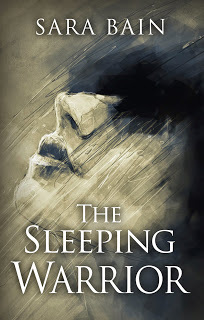 Since it's only a matter of weeks to the launch of The Ghost Tree, I've put The Sleeping Warrior on Kindle Countdown for the weekend between 18 and 21 September (that's this coming weekend).
Since it's only a matter of weeks to the launch of The Ghost Tree, I've put The Sleeping Warrior on Kindle Countdown for the weekend between 18 and 21 September (that's this coming weekend).I don't know why, but readers in the UK will be able to buy it at 99p while across the Pond it's only 99c. Apologies to UK readers for the inexplicable price hike, but that's the way Amazon works for some reason.
In effect, that means anyone can buy The Sleeping Warrior for said discounted price for a limited time (from 8am on the Friday to 8am Monday). After Monday morning, and I believe that's GMT, the price will return to £1.99 and $2.99 respectively.
You can't get a decent packet of sweeties for 99p/c, so I hope some of you readers out there will take up the offer and try out the novel.
It's had some fabulous reviews so, hopefully, will be worth the pennies/cents to you.
Should you buy it, read it and actually enjoy it, please would you also leave a review on Amazon. Reviews are so important to authors, even bad ones are better than none at all.
Published on September 14, 2015 13:36
July 29, 2015
Natural inspiration
 Ardvreck Castle, Inchnadamph, Assynt, SutherlandVisited my favourite place in the world, recently: the north west Highlands.This land holds an ancient natural beauty that is wild and unsullied and there is nowhere more inspirational to a fantasy writer like me.So inspirational, in fact, that the main character from The Ghost Tree is a native of Sutherland. Here are a few sepia snaps with a bit of added noise (to those photo techies out there) to illustrate what I mean.This place should be on everyone's bucket list.
Ardvreck Castle, Inchnadamph, Assynt, SutherlandVisited my favourite place in the world, recently: the north west Highlands.This land holds an ancient natural beauty that is wild and unsullied and there is nowhere more inspirational to a fantasy writer like me.So inspirational, in fact, that the main character from The Ghost Tree is a native of Sutherland. Here are a few sepia snaps with a bit of added noise (to those photo techies out there) to illustrate what I mean.This place should be on everyone's bucket list.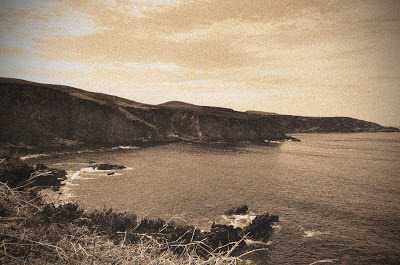 The edge of Rubha Duilich overlooking Enard Bay, Ross and Cromarty
The edge of Rubha Duilich overlooking Enard Bay, Ross and Cromarty Achnahaird Bay, Coigach Peninsula, Ross and Cromarty
Achnahaird Bay, Coigach Peninsula, Ross and Cromarty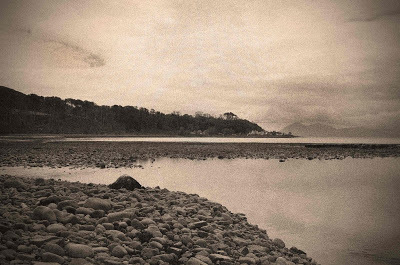 Applecross Bay looking on to the Isle of Skye, Ross and Cromarty
Applecross Bay looking on to the Isle of Skye, Ross and Cromarty
Published on July 29, 2015 15:12
July 4, 2015
Ghost story takes root
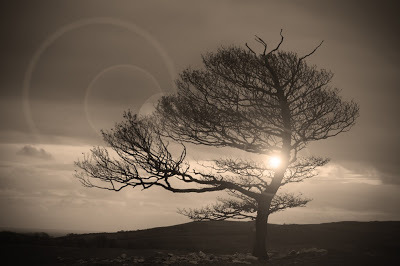 The last of the Ghost Trees, AuchencairnFinding inspiration as a writer comes easily when you live in an inspiring place, rich in scenery, culture, heritage and lore ... lots of lore.
The last of the Ghost Trees, AuchencairnFinding inspiration as a writer comes easily when you live in an inspiring place, rich in scenery, culture, heritage and lore ... lots of lore.My second novel, The Ghost Tree, is due to be published on October 1 this year by Urbane Publications.Staying true to my unhealthy dislike of genre compartmentalisation, this is a paranormal romance, thriller, crime fiction with its roots firmly planted in a 'true' poltergeist account that allegedly took place in the Parish of Rerrick, Auchencairn, Dumfries and Galloway, Scotland, in 1695.You can read the published account by Alexander Telfair, the minister who performed the two-week-long exorcism, here: http://www.mysteriousbritain.co.uk/scotland/dumfriesshire/hauntings/rerrick-poltergeist-1695.htmlThe old gnarled tree in the picture is all that remains of the haunted plantation in Telfair's account, then called The Ringcroft of Stocking, where stone mason and farmer Andrew MacKie contended with a violent noisy spirit that pestered his family for a few months at the turn of the 17th century.
There were three trees in living memory. The locals call them 'The Ghost Trees'. The two beeches died some time ago. This enduring oak was more resilient to the sweeping winds of the Solway hills and has survived both the ravages of time and, if Telfair's account is to be believed, the poltergeist.Legend has it that, when the last of the Ghost Trees dies, the Rerrick Parish Poltergeist will return.
My work of contemporary fiction took me to surprising places, from the realms of the dead to quantum physics, and my research on the subject came up with more unanswered questions than solutions to the phenomena of the paranormal and supernatural.
I'm still unsure whether I believe that "a ghost" can be described as a visitation from the dead, a symptom of a vivid imagination or a piece of observable data from a scientific equation. What is evident from all the theories and accounts I have read and all the 'experts' I have spoken to, is that many people truly believe that the dead can in some way return from the grave and interact with the living. It is also worrying to note that it seems to take a ritual involving God to remove it.
The Ghost Tree follows the misfortunes of a young man, MacAoidh Armstrong, who unwittingly buys a smallholding on the former subjects of the MacKie plantation. The ghost tree has died and the poltergeist has returned, but the pragmatic and stubborn Highlander does not believe in ghosts.
As the story unfolded during its construction, I found there was far more than the paranormal to contend with when a violent spirit haunts a 21st century home.The result was a terrifying but fascinating journey for me, especially when I was writing it in the middle of the night with my back to a draughty door.
Whether I believe in ghosts or not, I am still uncomfortable with the inexplicable and, until science proves one way or another that death is merely a transition into another form of existence, I will still need the light on at night when I face the reality of going to the loo.
Published on July 04, 2015 16:09
May 23, 2015
The warrior within: Libby Butler
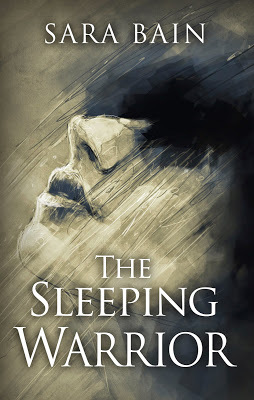 A successful author friend of mine recently advised me to write a review of my book since the paperback version is being re-released in July by my wonderful publishers Urbane Publications.
A successful author friend of mine recently advised me to write a review of my book since the paperback version is being re-released in July by my wonderful publishers Urbane Publications.Now writing a review of one's own book feels a bit odd to me, since I will naturally show bias towards the story, characters, writing and overall enjoyment of the novel.
That said, we all read in different ways. Some of us skim read, flicking through the pages for the action scenes and missing much of the subtleties of the story and the clever play on words. Some, on the other hand, practically count the words, immersing themselves into the world the author has created.
In literary critiques, we try and get into the author's head; attempting to find a purpose for the themes, the ways in which the characters behave and somehow link it all to the writer's personal reasoning.
The Sleeping Warrior wasn't born out of some counter-cultural crisis in my life nor is it based on anyone or any particular experience from a shadowy past. It just happened and I have heard a lot of writers say the same thing - start writing and the book will write itself.
Since authors like writing books they themselves would like to read, I think a selfie review would be counter-productive. I am therefore going to showcase the major character, Libby Butler, whose tale brings out the underlying themes to the main story arc: courage, introspection and existentialism.
I've been fortunate enough to have some fabulous five star reviews from independent reviewers who empathised with the characters, loved the twists and turns of the storyline and also praised my writing skills - what more could an author want?
I also noticed that some reviewers dropped stars because they couldn't invest in the characters: mainly because they simply didn't like them.
We all are blessed with good and tainted with bad traits of character. Sometimes life causes people to lose their way and it can take anything between a gentle prod to a catastrophic chain of events to see ourselves as others do. We all have a few redeeming qualities that will forgive the uglier parts of our characters.
This is the lesson of The Sleeping Warrior: fear is a dark place to be lost but everyone is capable of finding the warrior inside themselves, which is courage and the ability to familiarise with that person we see inside the mirror.
Libby ButlerThe concept for The Sleeping Warrior started with a character: Libby Butler, the acerbic young lawyer whose poor choices in life are beginning to hurt.
Libby's background:Twenty eight years old, Liberty Belle Butler was brought up on the rural outskirts of Stirling, Scotland. When her mother died, her father moved to London where Libby took her law degree. She remained in London after her father relocated to Edinburgh and, after qualifying as a solicitor, she took articles at a leading city law firm Gore, Matthews and Bottomley where she has remained, spending her years working up to the position of senior solicitor. Like all young solicitors, she has ambitions to become a partner. Libby has had a five-year relationship with social worker Tony Ridout and they live together in a second floor flat in South East London. The highly motivated Ms Butler, however, is having an affair with her boss Carl Bottomley but the relationship, like her work, is going stale. Libby’s mental health became poor after she was stalked and almost caught by and man who the police believe to be the elusive serial murderer they call The Vampire Killer. She has since developed a fear of the dark and holds distorted views of her body.
Libby's character:Libby is temporarily incapable of significant empathy towards others, being too immersed in her own troubles and misguided ambitions to properly respond to the needs of those closest to her. She is not a bad person, she is just a victim of city living. She is blinded by aspiration and her determination for success is driven by her own perceived personal failings, which are legion.
Libby's main problem is that she is an ordinary woman working in a profession which requires extraordinary qualities in which to succeed. Her shortcut to success - the affair with her boss - has failed to deliver her hopes.
"For the past two years, Carl had been the sole object of Libby Butler’s clandestine desires; the place where all her ambitions had come to reside in comfort. She targeted him as the golden goal of her forthcoming future success in both love and career and now her dreams had been torn apart by a woman who was younger, more beautiful and much slimmer than she."
The nature of her work requires a willingness to act against her conscience and has caused an internal conflict that is impossible to reconcile.
Like many people who blame poor choice on bad fortune, Libby is left unhappy, frustrated and angry with the world and everyone inside it.
"Dragging herself from the soft sofa, she stumbled through to the bedroom, the wine bottle clutched tightly in her hand. She slumped down on the stool at the vanity and objectively observed its crowded surface. She saw herself in the mirror and dared to look deeper."Staring back at Libby Butler was a worn out, twenty eight-year-old woman whose prime had already peaked and the dip on the eligibility chart was plummeting towards ‘not a chance’."Her hair was too long, too unruly and in desperate need of a freshen-up of colour. Her brown eyes, normally flecked with vibrant green, were dulled with the exhaustion of simply trying to exist. Her skin was pale, almost grey, and her lips pursed in indignation — for what cause, she could no longer remember. What was far worse, she was busting out of her size fourteen blouse. She rubbed at her eyes and forehead, as if to massage some enthusiasm back into her worn-out expression. "Libby had always been one of those fortunate individuals who could honestly attest that she was unfamiliar with depression. She believed that to fill her life with enthusiasm and positive thinking would keep the demons of negativity at bay. "The reflection before her, however, was lifeless with despair. If the eyes were truly windows to the soul, then Libby’s were showing large cracks that let the rain in. "She took another glug from the bottle and believed that the night had few terrors in comparison to the heartless light of day."
Her near-death encounter with a serial killer has had a devastating impact on her life and on her perceptions of reality. Libby has become afraid, not only of life but also of herself and what the city has forced her to become.
Her natural wit and keen intelligence are hidden behind a twisted mask of sarcasm that she readily unleashes, often on the undeserving and always on her competitors. But this humour is merely a shield to disguise her naturally clumsy antics and feelings of self-doubt and inferiority amongst her peers.
Libby's epiphany:
When Libby is called to a Metropolitan police station in the middle of the night to represent a 'foreigner' in custody as duty solicitor, the remaining fragments of the life she knows are scattered. The enigmatic Gabriel Radley is bewildering but strangely compelling. Through a series of disturbing events, Gabriel forces her to face her fears as well as herself and is not shy in telling her exactly what he thinks:
"I do not need to see beneath the cover of your mind, Libby Butler, for you leave its pages open for all the world to read. Despite your aggressive attempts to scheme and manipulate outwith the knowledge of others, your thoughts and deeds are as transparent as the glass in these windows and far less appealing to look through."
The Sleeping Warrior is available on Kindle now and the paperback is due to be published in July by Urbane Publications.
Published on May 23, 2015 11:03
February 22, 2015
From self to shelf
I have just signed a traditional publishing contract with Urbane Publications Ltd for my next book.
The Ghost Tree, the sequel to The Sleeping Warrior, is due off stone in October.
I put a lot of thought and effort into self-publishing The Sleeping Warrior but it's taken me a year to realise that I have neither the marketing skills, the time, the budget nor the experience in the publishing world to get my book out into the public domain with any great success.
Irrespective of gathering thousands of online friends on the big social media sites, it is notoriously difficult for the majority of new writers to get noticed as an individual inside Amazon's crowded halls. Even more impossible is the opportunity of securing a traditional publishing contract, even for good writers with excellent stories to tell. Despite some very successful self-published authors commandeering the top spots on Amazon's best-seller list, there is still a fair amount of snobbery and stigma attached to self-publishing that is not going away any time soon.
I feel very fortunate by managing to catch the eye of a few publishers for The Ghost Tree but decided to go with Urbane.
I met the publishing director, Matthew Smith, on Twitter. He kindly agreed to run an interview about his publishing house for my Ivy Moon Press blog and I was immediately struck by his passionate and professional approach to publishing.
Unless you sell millions of books for them, publishing houses do have a reputation for putting sales before the author. Urbane conducts its business the other way round and that's what I like about them.
Matthew's worked in the industry for a long time and uses this experience to sell his authors. He's also very active on social media, knows the market and all its quirks and and, more importantly, gets Urbane titles on the shelves.
I hope that this will be a very long and productive relationship between us.
The Ghost Tree, the sequel to The Sleeping Warrior, is due off stone in October.
I put a lot of thought and effort into self-publishing The Sleeping Warrior but it's taken me a year to realise that I have neither the marketing skills, the time, the budget nor the experience in the publishing world to get my book out into the public domain with any great success.
Irrespective of gathering thousands of online friends on the big social media sites, it is notoriously difficult for the majority of new writers to get noticed as an individual inside Amazon's crowded halls. Even more impossible is the opportunity of securing a traditional publishing contract, even for good writers with excellent stories to tell. Despite some very successful self-published authors commandeering the top spots on Amazon's best-seller list, there is still a fair amount of snobbery and stigma attached to self-publishing that is not going away any time soon.
I feel very fortunate by managing to catch the eye of a few publishers for The Ghost Tree but decided to go with Urbane.
I met the publishing director, Matthew Smith, on Twitter. He kindly agreed to run an interview about his publishing house for my Ivy Moon Press blog and I was immediately struck by his passionate and professional approach to publishing.
Unless you sell millions of books for them, publishing houses do have a reputation for putting sales before the author. Urbane conducts its business the other way round and that's what I like about them.
Matthew's worked in the industry for a long time and uses this experience to sell his authors. He's also very active on social media, knows the market and all its quirks and and, more importantly, gets Urbane titles on the shelves.
I hope that this will be a very long and productive relationship between us.
Published on February 22, 2015 09:48
November 22, 2014
SEEING STARS
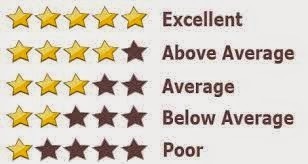 I spoke to Lucy Catten, one of the many well-respected, committed and talented book reviewers on Goodreads, recently who told me: "I'm drawn far more to books with a mix of really high and really low ratings than those with hundreds of mediocre ones. Far better that a story sparks strong feelings! I don't give scores in my reviews either - I think they're pretty pointless."
I spoke to Lucy Catten, one of the many well-respected, committed and talented book reviewers on Goodreads, recently who told me: "I'm drawn far more to books with a mix of really high and really low ratings than those with hundreds of mediocre ones. Far better that a story sparks strong feelings! I don't give scores in my reviews either - I think they're pretty pointless." If that is the case, why are we authors fixated on equating the quality of our work with a quantity of stars?
I suppose it's because authors put so much time and effort into producing their very best that they expect to be rewarded with a mark of excellence. It's like being at school: with five gold stars, you're at the top of the class.
With product feedback dominating the decisions in consumer choice, public opinion has usurped the long reign of the professional literary critic. Feedback for a book comes in the form of the reviewer, which is anyone and everyone, and the majority of readers aren't interested in whether that semi-colon is in the wrong place; how many adjectives there are to a sentence; or whether the reflexive pronoun has been lexicologically murdered, they simply mark a book according to the personal experience it has given them.
There is solace for those amongst us who have received some terrible reviews of their precious works. Even the world's greatest writers have had one-star ratings for a range of reasons, from not liking the story personally to not receiving the book on time. After a quick trawl through Amazon, the following is, from least favourite to favourite, my Top 30 list of the best (or worst) one-star reviews:

30 Emily Brontë,Wuthering Heights: “I am repelled by the absurd peregrinations of Brontë's spiteful, petty-spirited, self-absorbed characters”
29 Paulo Coelho,The Alchemist: “Allegorical nonsense”
28 Joseph Heller,Catch-22: “... one of the most tedious, poorly-written books I've ever read.”
27 Yann Martel, Life of Pi: “... dull pseudo-intellectual garbage.”
26 Helen Fielding,Bridget Jones’s Diary: “For anyone concerned about the ‘dumbing-down’ of humanity, here it is in all its glory.”
25 Irvine Welsh,Trainspotting: “I have no idea if this is a good story because I became bored and frustrated trying to translate the cockney crap.”
24 Ralph Steadman, Fear and Loathing in Las Vegas: A Savage Journey to the Heart of the American Dream: “Nothing more than a drug-induced binge.”
23 John Steinbeck, East of Eden: “This book was yellow and old. I did not want to touch it and threw it away.”
22 Hubert Selby Jnr, Requiem for a Dream: “This entire book is written in ghetto/white trash dialect spelled phonetically, with minimal punctuation.”
21 Bret Easton Ellis, American Psycho: “A juvenile attempt at grossing the audience out.”
20 Markus Zusak, The Book Thief: “What's with all the color descriptions? I felt like I was working through a box of crayons.”
19 Joseph Conrad, Heart of Darkness: “Really boring. It's about steamboats and the ivory trade.”
18 Ernest Hemingway, For Whom the Bell Tolls: “You spent more time wondering what the gypsies are saying than the actual story.”
17 George RR Martin, Game of Thrones: “There is no point to this soap opera. Everyone dies.”
16 Gabriel Garcia Marquez, One Hundred Years of Solitude: “... tedious, pointless, and unpleasant and all the characters are creeps.”
15 Scott Donaldson, On the Road: “Three hundred pages of whining, grousing and getting loaded.”
14 Tracy Chevalier, Girl with a Pearl Earring: “Aside from a memorable metaphor on page one, this book is bland as a pauper's meal of yesterday's potatoes.”
13 Ken Kesey, One Flew Over the Cuckoo’s Nest: “... if you were interested in crazy people this is the book for you.”
12 Kurt Vonnegut, Breakfast for Champions: “I'd say it was a book purposely written stupidly to appear clever.”
11 Anne Frank, The Diary of a Young Girl: “She talks of her lady parts and its SERIOUSLY GROSS.”
10 Charles Dickens, A Tale of Two Cities: “Many words used are obsolete.”
9 John Milton, Paradise Lost: “It was so far beyond me that I embarrassed myself.”
8 Orson Scott Card, Enders Game: “... an awful lot of all male shower scenes for an author who doesn't like gay people.”
7 Mary Shelley, Frankenstein: “The creature went from hideous dumb clod to hideous Collin Firth in a matter of months via eavesdropping on some peasants.”
6 Anthony Burgess, A Clockwork Orange: “The made-up slang words ruined the book for me.”
AND FOR MY VERY FAVOURITE TOP FIVE:
 5 Aldous Huxley, Brave New World: “a bit too scientific for me.”
5 Aldous Huxley, Brave New World: “a bit too scientific for me.” 4 Herman Melville, Moby Dick: “Too nautical for me.”
3 Anne Rice, Interview with the Vampire: “Being a vampire myself I can assure you that this is nothing at all like it really is. Anne Rice knows nothing of the world of darkness!”
2 Stephen King, The Shining: “got ruined for me when that Friends episode told me how it ended.”
1 George Orwell, 1984: “He doesn't know a thing about the '80s. Not ONCE did he mention Def Leppard or Karma Chameleon.”
You can't win 'em all!
Published on November 22, 2014 11:45
October 5, 2014
THIRD WAY HOUSE
 Is there a middle option between conventional and self-publishing?
Is there a middle option between conventional and self-publishing?There's no doubt that a good book deserves a professional service but most new authors - many with works of potential excellence - will know that their precious title is littering the floors of traditional publishing houses and will never see the light of day.
More and more often, with staff and cost cuts in the publishing industry, typos and errors are creeping into professionally-published manuscripts and many companies are reluctant to fork-out a percentage of their ever-decreasing marketing budget on their authors. Some of the smaller organisations have no marketing budget at all. The burden of promotion and proofing are therefore left almost exclusively to the author.
DIY publishing has been made easy and cost-free by the likes of Amazon and Smashwords but, with so much choice on the market, books are judged by their cover. A bad cover design can let an author down as can a poorly edited manuscript.
Then there's the marketing and publicity of a book to get it seen. This, to most authors I have spoken to (conventionally and self-published), is where the real work begins. Months of endless networking, press releases and author interviews doesn't necessarily equate to sales, unless you're an established author with a strong fan base. I've also heard a lot of traditionally published authors complain that they have been forced to take responsibility for the promotion of their own works as publishing houses invest time and expense on other services and their better-established authors.
So, if a book's worth publishing and an author is prepared to put in vast amounts of time and effort, why do we shudder at the thought of paying out cash for professional services?
I know a good few traditionally published authors who are finding the DIY publishing model far more lucrative. I don't know any of them who do not pay for a professional editing service. Similarly, most of them fork out for a good cover designer. They do this to maintain the standard of excellent quality that readers expect from them and will continue to buy into. Some of those authors pay for the services of a publicist to professionally market their product.Unscrupulous vanity publishers (and that's not a syllogistic statement) have ruined perceptions on paying for publishing. The stigma attached to vanity and the warnings against them are a good reason to stay well clear. Jonathon Clifford, on his excellent site Vanity Publishing: A Campaign for Truth and Honesty makes it very clear what a good vanity publisher will NOT do: http://vanitypublishing.info/agoodvpwillnot.htm
 So what's the alternative? Is there a middle road to publishing between conventional and DIY?I've been speaking to Matthew Smith (pictured right), director of Urbane Publications, a Kent-based company that calls itself a 'collaborative' publishing house: an organisation of professional book people who share the costs of publishing a book with the author in a mutually beneficial contract. He calls it The Third Way.I'm not advocating their services but am curious as to the effectiveness of their delivery. Are they a brand new business model for the industry or just another vanity publisher under a different guise? If they are what they say on the tin, then this is indeed an exciting time for publishing.Matthew Smith certainly puts up a compelling argument that his Third Way approach is the way forward. He says: '[There is a Third Way] that combines all the benefits of traditional publishing (an engaged editor, script development, knowledge, design, route to market, promotion etc) but gives the author creative and commercial engagement during every part of the process. Every aspect of the project is a shared experience with shared goals, a genuine partnership. And that includes the sharing of the revenue, because every author deserves a fair return on their words.'If you're interested in learning more, pop over to my Ivy Moon Press site and decide for yourself.
So what's the alternative? Is there a middle road to publishing between conventional and DIY?I've been speaking to Matthew Smith (pictured right), director of Urbane Publications, a Kent-based company that calls itself a 'collaborative' publishing house: an organisation of professional book people who share the costs of publishing a book with the author in a mutually beneficial contract. He calls it The Third Way.I'm not advocating their services but am curious as to the effectiveness of their delivery. Are they a brand new business model for the industry or just another vanity publisher under a different guise? If they are what they say on the tin, then this is indeed an exciting time for publishing.Matthew Smith certainly puts up a compelling argument that his Third Way approach is the way forward. He says: '[There is a Third Way] that combines all the benefits of traditional publishing (an engaged editor, script development, knowledge, design, route to market, promotion etc) but gives the author creative and commercial engagement during every part of the process. Every aspect of the project is a shared experience with shared goals, a genuine partnership. And that includes the sharing of the revenue, because every author deserves a fair return on their words.'If you're interested in learning more, pop over to my Ivy Moon Press site and decide for yourself.
Published on October 05, 2014 09:15
September 30, 2014
Wigtown showcase sets tongues wagging
 WagTongues pop-up bookshop joined the Wigtown Book Festival on Saturday with its own mini-festival of readings, talks, interviews and books.
WagTongues pop-up bookshop joined the Wigtown Book Festival on Saturday with its own mini-festival of readings, talks, interviews and books.Run by the Dumfries Writers’ Collective, WagTongues is a bookshop which pops up without warning across Dumfries and Galloway and over the border.Its remit is to sell precious things: local books by local writers, including poetry, fiction, memoir and history from Sally Hinchclife, Donald Adamson, Hugh Bryden, Mary Smith, D D Hall, Gwen Kirkwood, Margaret Elphinstone, Claire Cogbill, JoAnne McKay, Kriss Nichol, Janet Walkinshaw and, of course, me.
 Celebrated poet Hugh Bryden
Celebrated poet Hugh Brydensearches for inspiration for
The Poet Is InMember Mary Smith, said: “WagTongues runs a programme of events whilst we’re open, so there’s the opportunity to meet authors, listen to readings, hear interviews and attend mini-workshops as well as browse through and buy wonderful books.
“We take books from any writer or publisher in the region and anyone who would like to join us should send an email wagtongues@aol.com”
 Sally Hinchcliffe and JoAnne McKayThe bookshop has this year enjoyed a successful festival run.
Sally Hinchcliffe and JoAnne McKayThe bookshop has this year enjoyed a successful festival run.It was invited to be part of the Dumfries and Galloway Arts Festival in May when it held a two-day pop-up bookshop and mini literary festival in Castle Douglas.WagTongues recently took advantage of another invitation by The Stove, Dumfries, where it popped-up during the Nithraid and In Our Town events. Its innovative literary venture, the Poet Is In, proved popular with the afternoon crowds.Last year WagTongues appeared twice at the Wigtown Book Festival and at The Stove, Dumfries, during Scotland’s Book Week in November.A few weeks ago, they moved across the Border for the first time to collaborate with the Carlisle Writers at the Borderlines Book Festival.WagTongues member Sally Hinchcliffe, said: “We're really pleased to have been invited to take part in both Borderlines and Nithraid, two great up-and-coming events in the region, and a chance to build bridges both across borders and with different art forms.”
 Chick amused his audience
Chick amused his audiencewith a performance of
poems by rote.On Saturday, WagTongues popped-up in Wigtown during the Book Festival at the Quaker Meeting House and adjoining garden.An impressive display of books in the outside pavilion attracted browsers and purchasers while, inside, festival-goers listened to the many talks and readings by Dumfries and Galloway authors and poets.
 I sold three copies of
I sold three copies ofThe Sleeping Warrior on the day!At the same time, the region's most talented poets sought inspirational thoughts from the public for a set of spur-of-the-moment poems which delighted audiences.Poet and WagTongues member JoAnne McKay said: “It's fantastic that WagTongues has popped-up three times during September, and each appearance has so far had a very different flavour."We would like to say a huge thanks to all the writers and publishers who came along and to everyone who volunteered to help out.“We exist to promote local writing, and love doing it, even if it does mean a few sleepless nights!”WagTongues takes no commission with the full price of sales going directly to the authors and the events will raise funds for Arthritis Care Scotland. Further information from http://wagtongues.wordpress.com
Published on September 30, 2014 17:25



